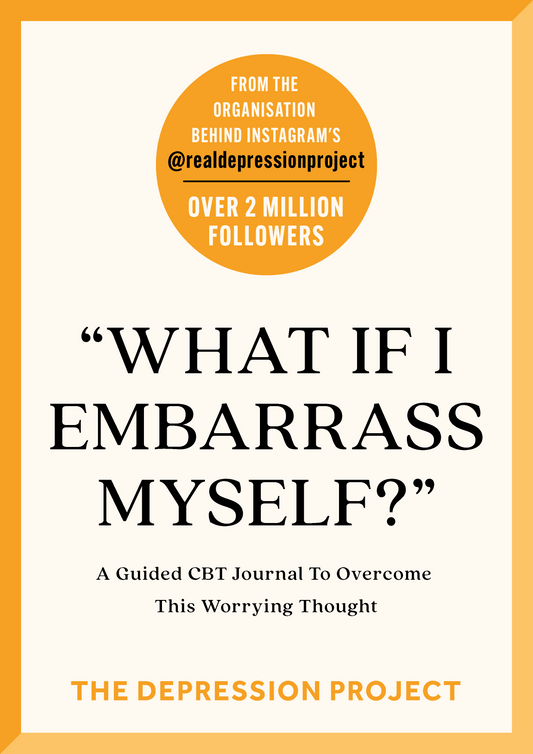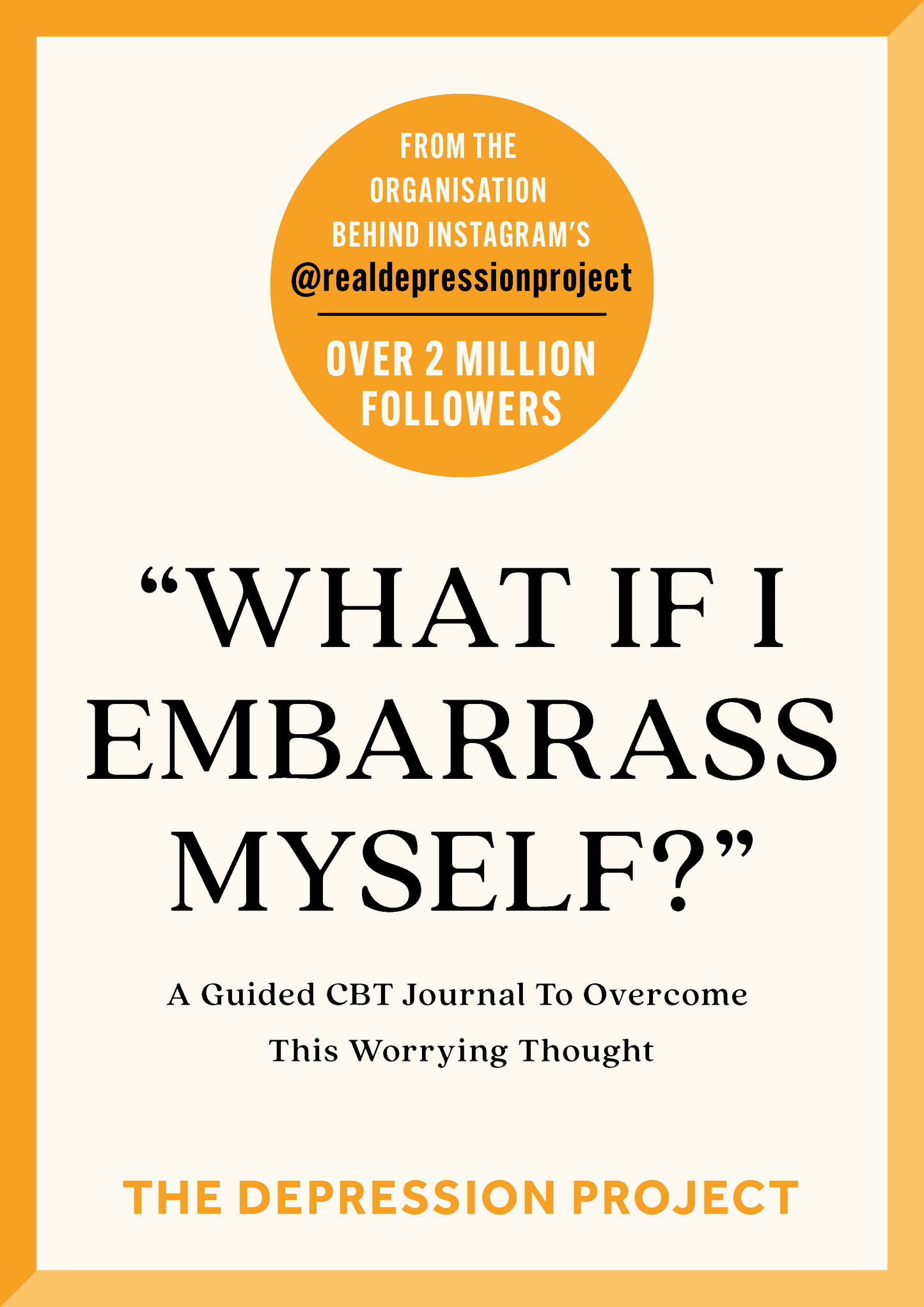
Do you often worry "what if I embarrass myself?"
In early 2022, The Depression Project posed a question to our 3,000,000+ person social media community:
What are the most common “what if ... ?” worrying thoughts that you experience?
Thousands of people responded, and one of the most common worrying thoughts people mentioned was:
“What if I embarrass myself?”
Unfortunately, this can indeed be a very common worrying thought for people to experience, and in addition to causing you to feel uncomfortable, nervous and on edge in situations involving other people, it can also result in you engaging in “safety behaviours” that can negatively impact you. For example:
- If you avoid social situations because you’re worried you’ll embarrass yourself, it can result in you having significantly fewer friendships than you otherwise would, and contribute to you feeling lonely;
- If you’re reserved and guarded around others because you’re worried you’ll say something to embarrass yourself if you open up more, it can result in other people not getting to know you as well as they otherwise would, and to your relationships lacking the intimacy and depth you might want;
- If you always go along with what everyone else thinks, feels and wants because you’re worried you’ll embarrass yourself if you express what you think, feel and want, then it can result in you not being well understood by others, and to you not getting your own needs and wants met;
- If you rarely speak at work because you’re worried you’ll say something to embarrass yourself, it may limit how much you’re able to contribute in your job, and hold you back from advancing as much as you otherwise would in your career;
- If you plan and rehearse what you’re going to say ahead of time because you’re worried you’ll embarrass yourself if you don’t, then it can result in you having much less time to do other things that matter to you;
- If you avoid trying new things that you’d like to do because you’re worried you’ll embarrass yourself if you do so, then it can result in you feeling unfulfilled, and in you having less enjoyment in your life than you otherwise would.
Consequently, because the worrying thought “what if I embarrass myself?” can lead to so many negative impacts like so, we’ve created this cognitive behavioural therapy-based journal, in order to:
- Help you let go of this worrying thought;
- Help you feel much more comfortable with people as a result, and no longer so compelled to engage in “safety behaviours” like the ones we described that can end up hurting you.
Here’s A Breakdown Of Exactly What This Journal Will Cover
PART 1: Where Does Your Worrying Thought “What If I Embarrass Myself?” Really Come From?
In order to let go of this worrying thought, the first step you need to take is to understand the reasons why this worrying thought is one that you think. And, on that note, we're going to begin this journal by talking about:
- The uncertainty that is inherently present in situations that involve other people.
- How intolerance of uncertainty fuels worrying thoughts like “what if I embarrass myself?"
- The three negative beliefs that intolerance of uncertainty stems from - i.e. firstly, the belief that the outcome of an uncertain situation involving other people will be negative; secondly, the belief that this negative outcome will leave you feeling severely embarrassed; and thirdly, the belief that you will be unable to cope with this feeling of embarrassment.
After explaining all of the above in detail, we'll then share with you a handful of journal prompts for you to think about and write out your response to - in order to help you better understand what the origin of the worrying thought "what if I embarrass myself?" is for you in particular.
PART 2: How To Balance Negative Beliefs About Uncertainty
In the second part of this journal, we'll share with you several strategies - along with accompanying journal prompts - in order to make your negative beliefs about uncertainty in situations involving other people much more balanced - such as, for example:
- “The outcome of an uncertain situation involving other people will be positive, negative or somewhere in between.”
- “If the outcome is negative, it may leave me feeling mildly embarrassed, moderately embarrassed or severely embarrassed."
-
“Even if I do end up feeling severely embarrassed, I will be able to handle it.”
As we'll explain, if your negative beliefs about uncertain situations involving other people are much more balanced like so, then:
- You’ll find it much easier to tolerate this uncertainty, because it won’t feel as stressful and threatening as it does when you hold negative beliefs about it;
- Consequently, you’re much less likely to worry “what if I embarrass myself?”
PART 3: How To Gradually Let Go Of "Safety Behaviours" That Keep You A Prisoner Of The Worrying Thought "What If I Embarrass Myself?"
The third part of this journal is focused on "safety behaviours" - i.e. any behaviours you engage in to try to prevent yourself from feeling embarrassed in situations that trigger your worrying thought “what if I embarrass myself?” In particular, we will cover:
- The reasons why engaging in "safety behaviours" can keep you a prisoner of the worrying thought "what if I embarrass myself?" (in addition to having an array of other consequences like we've already mentioned);
- The step-by-step system you can follow to gradually let go of "safety behaviours" in a manageable way that isn't too overwhelming for you;
- Accompanying journal prompts to help you implement this system.
FAQ #1: Why should I be confident this journal will help me?
This journal is grounded in cognitive behavioural therapy - which in case you don't know, is a leading form of treatment for anxiety, panic attacks, phobias, depression, personality disorders, and a wide range of other mental health issues.
Additionally, this journal is also written with the warmth, care, encouragement and insight that, with 3,000,000+ followers on social media, The Depression Project has become renowned for :)
FAQ #2: What format does this journal come in?
This journal is available in two different formats for you to choose from:
- PDF - which you will be able to download instantly after purchase, and then print out at your home, office or local printer.
- Paperback (if you live in the US or Canada) - which will be delivered to you within 4-8 business days. Shipping costs are US$7.95 within the US and CAD$14 within Canada. This shipping cost is a flat rate, so whether you order one journal, or multiple journals, the shipping cost will be the same (if you would like to, you'll find the option to add one or more other journals to your cart below so that you can save on shipping). Once your order has been shipped, you will be emailed a number so that you can track it.
FAQ #3: What if I give this journal a try but I don't like it?
We're extremely, extremely confident that you're going to find this journal immensely helpful. But, just in case you don't, the PDF version of this journal comes with a 60 Day, No-Questions-Asked, 100% Moneyback Guarantee!

If you have any questions about this journal, then please feel free to click here and contact us so that someone from our friendly team can answer them for you :)
Otherwise, we hope you choose to get this journal, because we know that you're going to find it really, really helpful!
All our love,
The Depression Project Team.
Format Options

